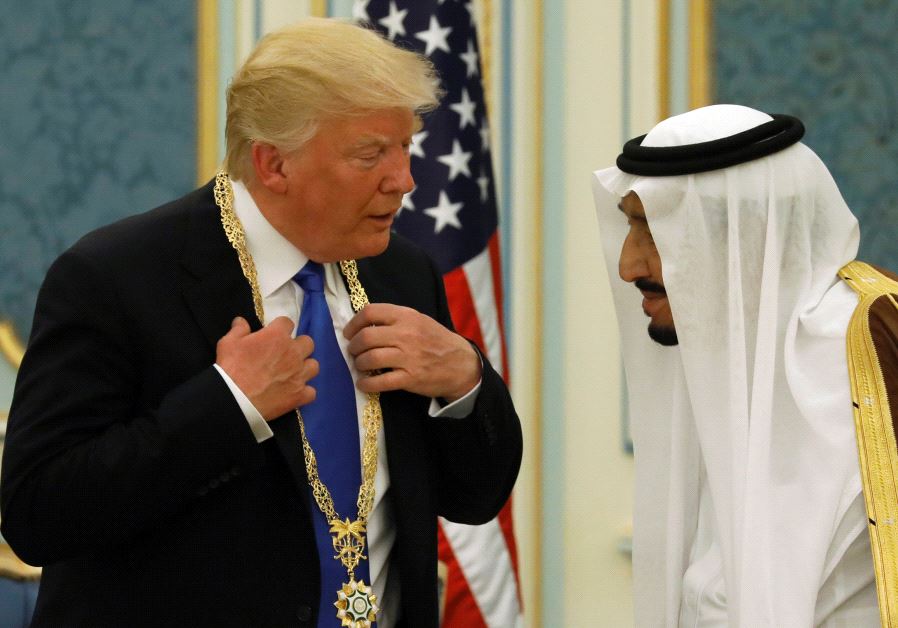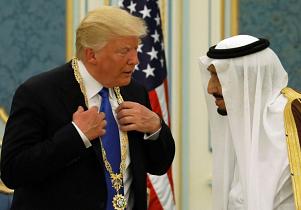President Trump arrives in Saudi Arabia - Ignores Human Rights
US president Donald Trump receives warm welcome by King Salman as he seeks to repair ties with Washington's closest Arab ally. On the first leg of his first foreign trip since taking office as the custodian of White House and in a crucial test abroad as political scandals mount at home, President Donald Trump has arrived today in Saudi Arabia on his first foreign trip since becoming president. His eight-day shuttle trip will also take the Palestinian territories, in Israel, Brussels, the Vatican, and Sicily.
In a red-carpet airport welcome, Saudi King Salman bin Abdulaziz Al Saud greeted Trump, his wife Melania and his entourage shortly after they landed in the capital, Riyadh. Trump will hold a series of meetings with the king and other Arab and Muslim leaders on Saturday and Sunday, before jetting off to other countries as per his itinerary.
President Trump's Saudi royal hosts have pulled out all the stops for this visit. They are lavishing him with an extravagant welcome not shown to his predecessor, Barack Obama, whom they felt was soft on their rival, Iran. Many Saudis are immensely proud that, despite his mounting troubles at home, the US president has chosen their country as the first stop on his inaugural overseas tour. But pressed further, a lot of ordinary Saudis will voice their dislike of US policies in the region and their conviction that the US, and by extension the West, is intrinsically anti-Islamic.
As the leader of Arab world, Saudi Arabia is concerned about Trumps regular anti-Islamic rhetoric even for poll prospects. Trump caused controversy during his campaign by calling for Muslims to be temporarily banned from entering the US over security concerns. Legislation aimed at restricting travel from several Muslim-majority countries remains tied up in the US courts.
On Sunday President Trump will try to address these concerns in a speech to more than 40 leaders of Muslim nations in which he will call for a united stand against extremism and intolerance. Some have already commentated that Donald Trump is an unusual choice to deliver such a message but for now, Saudi officials are giving him the benefit of the doubt.
On Tuesday the 23rd, after visiting Israel (Jerusalem) for a talk with Israeli president, Trump will travel to Bethlehem in the West Bank for talks with Palestinian President Mahmoud Abbas. Peace talks with Israel will top the agenda and Trump is expected to express his support for Palestinian "self-determination".
On Sunday the May 21 President Trump will try to address these concerns in a speech to more than 40 leaders of Muslim nations in which he will call for a united stand against extremism and intolerance. Some have already commentated that Donald Trump is an unusual choice to deliver such a message but for now, Saudi officials are giving him the benefit of the doubt. One leader who will not be attending the summit will be Sudan's President Omar al-Bashir. President Bashir is wanted by the International Criminal Court on war crimes charges and the US was reported to be unhappy about his planned attendance.
Trump will attend the Arab Islamic American Summit in Riyadh and speak about his "hopes of a peaceful vision of Islam". Aides say the president hopes his speech will resonate worldwide and express "a common vision of peace, progress and prosperity". Trump caused controversy during his campaign by calling for Muslims to be temporarily banned from entering the US over security concerns. Legislation aimed at restricting travel from several Muslim-majority countries remains tied up in the US courts. The summit agenda is expected to focus on combating Islamist militants and the growing regional influence of Iran. Trump has been a fierce critic of the Iran deal which eased sanctions in return for a curb on its nuclear activities.
On Saturday, Trump is expected to announce an arms deal with Saudi Arabia worth more than $100bn, in what could be the biggest such agreement in history. US officials familiar with the package told the media that the deal would include Abrams tanks, combat ships, missile defence systems, radar and communications and cyber security technology.
Multi-billion dollar deals between the USA and Saudi Arabia will be signed as US President Donald Trump's first foreign trip begins in Riyadh. Trump and his wife Melania were greeted in the Saudi capital by King Salman on Saturday morning local time. Saturday's deals on arms and with energy giant Aramco are expected to be worth at least $150bn (£115bn). On Saturday morning, Amin Nasser, the chief executive of Saudi oil giant Aramco, said $50bn (£38bn) of deals would be signed with 11 US companies. The deal is part of a wider drive to diversify the Saudi economy away from oil.
Separately, US media say Saudi Arabia will commit to buying about $100bn of US-made arms. Saudi Arabia has been fighting Houthi rebels in neighbouring Yemen since March 2015. The United Nations says about 10,000 people have been killed since the fighting began, with Yemen on the verge of famine.
On Wednesday 24 May, President Trump will arrive early in Rome and have an audience with Pope Francis. The two men have appeared at odds on many subjects including climate change and the plight of refugees, but the Pope has said he will give the president an open-minded hearing. Later, Trump then flies to Brussels where he will be greeted by King Philippe of Belgium and Prime Minister Charles Michel. After talks with EU leaders and France's new President Emmanuel Macron, Trump will attend a meeting of NATO leaders. This will be closely watched after Trump's conflicting pronouncements on the alliance. During his campaign, he called Nato "obsolete", although in April he reversed his stance. The US leader is expected to repeat his demand that other Nato members increase their contributions.
The last stop on Trump’s tour will be the picturesque Sicilian town of Taormina where he will attend a G7 summit. The other G7 leaders are eager to hear Mr Trump's thoughts on trade and other issues at first hand. Trump's national security adviser has said that the president will "press America's economic agenda and call for greater security co-operation".
Hours before Trump's arrival in Riyadh, Saudi air defence units said they had brought down a rocket south of the capital, Riyadh, that was fired from Yemen by Houthi rebels. Saudi warplanes are reported to have carried out retaliatory strikes on targets close to the Yemeni capital, Sanaa.
Saudi Arabia, which enforces a strict interpretation of Islam including a total ban on alcohol, is perhaps an unusual venue for Keith - whose hits include I Love This Bar, Whiskey Girl, and Drunk Americans. Saturday's concert is open only to men aged over 21, who are required to dress in traditional Saudi tunics.
Unlike his predecessor, Barack Obama, Trump is not expected to highlight human rights during his trip. And aside from the formal diplomacy, US country music star Toby Keith will perform a free concert in Riyadh on Saturday alongside Saudi singer Rabeh Sager.
Unlike his predecessor, Barack Obama, he is not expected to highlight human rights during his trip.
Comments
There are 0 comments on this post













